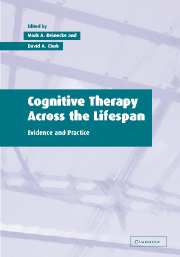Book contents
- Frontmatter
- Contents
- List of contributors
- Foreword
- 1 Cognitive therapy across the lifespan: conceptual horizons
- 2 Cognitive theory and therapy of depression
- 3 Cognitive theory and therapy of bipolar disorders
- 4 Regulation of emotion in generalized anxiety disorder
- 5 Cognitive theory and therapy of obsessions and compulsions
- 6 The cognitive model of panic
- 7 Treating obsessional problems using cognitive-behavioral therapy
- 8 Narcissistic personality disorder
- 9 Cognitive therapy and the self
- 10 Promoting cognitive change in posttraumatic stress disorder
- 11 Cognitive theory and therapy of social phobia
- 12 The cognitive model of bulimia nervosa
- 13 Cognitive therapy and schizophrenia
- 14 Cognitive-behavioral interventions for alcohol abuse and dependence
- 15 Cognitive approaches to understanding, preventing and treating child and adolescent depression
- 16 Cognitive-behavioral interventions in childhood anxiety disorders
- 17 Attention deficit/hyperactivity disorder
- 18 Cognitive-behavioral interventions for children with conduct problems
- 19 Processes of change in cognitive therapy
- 20 Cognitive therapy in the twenty-first century: current status and future directions
- Index
Foreword
Published online by Cambridge University Press: 05 July 2014
- Frontmatter
- Contents
- List of contributors
- Foreword
- 1 Cognitive therapy across the lifespan: conceptual horizons
- 2 Cognitive theory and therapy of depression
- 3 Cognitive theory and therapy of bipolar disorders
- 4 Regulation of emotion in generalized anxiety disorder
- 5 Cognitive theory and therapy of obsessions and compulsions
- 6 The cognitive model of panic
- 7 Treating obsessional problems using cognitive-behavioral therapy
- 8 Narcissistic personality disorder
- 9 Cognitive therapy and the self
- 10 Promoting cognitive change in posttraumatic stress disorder
- 11 Cognitive theory and therapy of social phobia
- 12 The cognitive model of bulimia nervosa
- 13 Cognitive therapy and schizophrenia
- 14 Cognitive-behavioral interventions for alcohol abuse and dependence
- 15 Cognitive approaches to understanding, preventing and treating child and adolescent depression
- 16 Cognitive-behavioral interventions in childhood anxiety disorders
- 17 Attention deficit/hyperactivity disorder
- 18 Cognitive-behavioral interventions for children with conduct problems
- 19 Processes of change in cognitive therapy
- 20 Cognitive therapy in the twenty-first century: current status and future directions
- Index
Summary
The remarkable development of cognitive intervention strategies to ameliorate maladaptive emotional and behavioral responses began in the 1960s with a specific focus on the use of cognitive constructs of depression and anxiety. In those days we relied on rather simple research methodologies and treatment formulations. What began as an attempt to redress oft-cited deficiencies in psychoanalytic and behavioral theory and treatment of emotional disorders has evolved 40 years later into a genuine paradigmatic shift in our approach to a broad range of psychological problems in children, adolescents, and adults.
Cognitive theory, therapy, and research have shown remarkable progress in a number of ways over the last few decades. Cognitive and cognitive-behavioral perspectives have been applied in very creative ways to a much broader range of clinical phenomena than originally imagined. New and innovative treatment approaches are continually under development and refinement. There is a greater understanding of the rapeutic issues involved in the immediate effectiveness and long-term efficacy of cognitive therapy, and in the processes of change. Research into the cognitive basis of psychological disorders has attained a much higher standard as a result of contributions from experimental cognitive, developmental, and social psychology. Newer theoretical models that recognize the multidimensional, interactive, and dynamic nature of the human condition have been proposed. Cognitive theory and research have been enriched by the ongoing contributions of a large number of researchers and practitioners from diverse backgrounds in experimental, social, and developmental psychology as well as psychiatry and the neurosciences.
- Type
- Chapter
- Information
- Cognitive Therapy across the LifespanEvidence and Practice, pp. xi - xiiPublisher: Cambridge University PressPrint publication year: 2003



